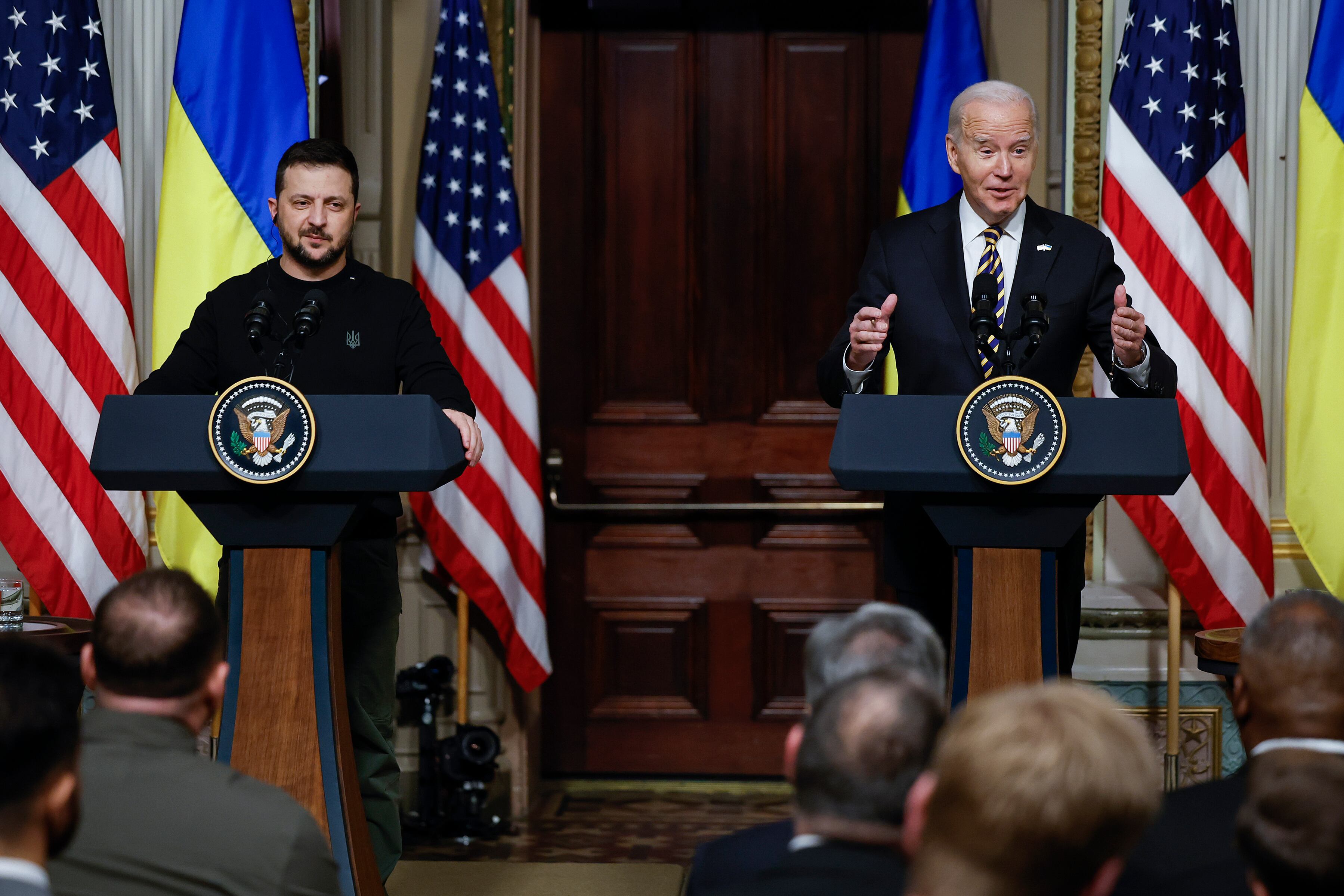WASHINGTON ― Ukrainian President Volodymyr Zelenskyy made a last-minute visit to Washington on Tuesday to make the case for additional air defense support.
But it’s unclear whether Congress will overcome its partisan gridlock and pass the $61 billion supplemental package in economic and security aid needed to unlock that assistance.
“President Biden and I discussed how to increase our strength for next year: air defense and destroying Russian logistics on Ukraine’s land,” Zelenskyy said while taking questions from reporters at a White House press conference, his first time doing so in his three trips to Washington since Russia’s invasion. “Like our victory on the Black Sea, we aim to win the air battle, crushing Russian air dominance.”
Zelenskyy said achieving air superiority against Russia would allow Ukraine to “intensify our ground offensive in 2024 with our control of the skies: who controls the skies controls the war’s duration.”
He also noted he met with U.S. defense industry leaders who “advised us on how to make our defense industries work faster and more effectively.” The Commerce Department hosted a U.S.-Ukraine Defense Industrial Base Conference last week with the aim of bringing the two countries’ defense industries closer together.
The Ukrainian president swung by Washington on Tuesday on his way back from Argentinean President Javier Milei’s inauguration with the aim of convincing increasingly skeptical Republican lawmakers in the U.S. to pass additional Ukraine aid.
Zelenskyy addressed the full Senate and met independently with House Democrats, but House Speaker Mike Johnson, R-La., did not schedule time for him to brief the full House — the main obstacle to getting an aid package over the finish line. At the White House, he described his meeting with Johnson as “positive.”
“But we know that we have to separate words and particular results,” Zelenskyy told reporters. “Therefore, we will count on particular results.”
It looks increasingly unlikely Congress will act on Ukraine aid by the end of the year, if at all.
At the end of the week, Johnson intends to put the House on recess through the holidays, despite pleas from Senate Majority Leader Chuck Schumer, D-N.Y., to stay in session to move Biden’s massive defense supplemental spending request. The request includes funds for Ukraine, Israel, the Indo-Pacific and the U.S. southern border.
Pausing movement until January would intertwine it with what’s shaping up to be a contentious debate over fiscal 2024 spending levels, with the continuing resolution set to expire toward the end of the month.
While Ukraine aid still enjoys majority bipartisan support in both chambers, a contingent of House Republicans who previously voted to arm Kyiv remain skeptical of appropriating more money after passing a cumulative $113 billion last year to help the war-torn country defend itself against Russia. Johnson has refused to put a Ukraine aid package on the floor unless it’s paired with a hardline immigration bill opposed by Democrats.
And while Biden has said he’s willing to make “significant compromises” to advance Ukraine aid — including overhauling U.S. asylum laws — Republicans have blocked the package from moving forward in the Senate, despite the fact that they’re significantly more supportive of Kyiv than many of their House colleagues.
The Biden administration has less than $5 billion to continue transferring weapons to Ukraine and roughly $1 billion to backfill U.S. stockpiles of equipment it has already sent Kyiv.
Senate Appropriations Chairwoman Patty Murray, D-Wash., issued a statement after Zelenskyy’s visit, noting that “failing to renew aid altogether may well allow [Russian President Vladimir] Putin to win the war.”
And Schumer said “if we don’t pass it quickly, it will send a signal to the whole world that we are abandoning Ukraine and could start a snowball cascading to Ukraine’s detriment and to our detriment.” Zelenskyy has previously warned Ukraine will lose the war without additional aid.
The Senate Democrats’ aid bill hews closely to Biden’s $106 billion defense supplemental request. Of the $61 billion for Ukraine, roughly $44 billion would go toward military support for Kyiv while increasing the president’s authority to continue transferring weapons to the Ukrainians and Israelis from U.S. stockpiles. It also includes roughly $14 billion in Israeli military aid and $2 billion in Foreign Military Financing for Indo-Pacific security partners.
Senate Armed Services Chairman Jack Reed, D-R.I., and Sen. Mitt Romney, R-Utah, separately told reporters Zelenskyy emphasized the need for this money to obtain better Ukrainian air defense systems after his address to the Senate.
Romney said Zelenskyy especially singled out the Patriot missile system and longer-range Army Tactical Missile Systems as especially important.
Russia attacked Kyiv with a barrage of eight ballistic missiles on Monday, wounding four people. Ukrainian air defenses shot down four of those missiles.
Bryant Harris is the Congress reporter for Defense News. He has covered U.S. foreign policy, national security, international affairs and politics in Washington since 2014. He has also written for Foreign Policy, Al-Monitor, Al Jazeera English and IPS News.




